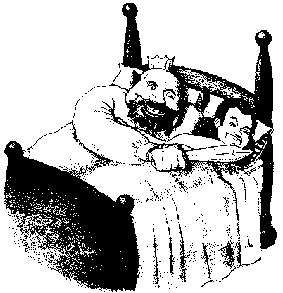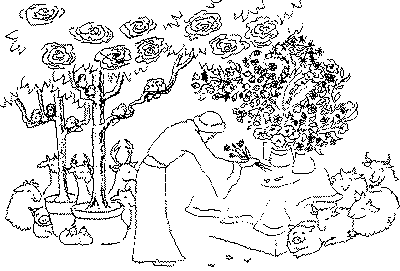52,539. KING FRUITFUL AND QUEEN SIVALI [CHAPTER 2. GAINING POWER]

The baby grew into a little boy. His friends took to making fun of him for not being of high-class birth like they were. So he went and asked his mother who his father was. She told him to pay no attention to what the other children said. She told him his father was the dead King Badfruit of Mithila, and how his brother, Prince Poorfruit, had stolen the throne. After that, it didn’t bother him when the others called him “son of a widow."
Before he was sixteen, the bright young Fruitful learned all there was to know about religion, literature and the skills of a warrior. He grew into a very handsome young man.
He decided it was time to regain his rightful crown, which had been stolen by his uncle. So he went and asked his mother, “Do you have any of the wealth that belonged to my father?" She said, “Of course! I did not escape empty-handed. Thinking of you, I brought pearls, jewels and diamonds. So there is no need for you to work for pay. Go directly and take back your kingdom."
But he said, “No Mother, I will take only half. I will sail to Burma, the land of gold, and make my fortune there." His mother said, ‘No my son, it is too dangerous to sail abroad. There is plenty of fortune here!" He said, “I must leave half with you, my mother, so you can live in comfort as a queen should." So saying, he departed by ship for Burma.
On the same day that Prince Fruitful set sail, his Uncle King Poorfruit became very ill. He was so sick that he could no longer leave his bed.
Meanwhile, on the ship bound for Burma, there were some 350 people. It sailed for seven days. Then there was a violent storm that damaged and weakened the ship. All except the prince cried out in fear and prayed for help to their various gods. But the Bodhisatta did not cry out in fear; the Enlightenment Being did not pray to any god for help. Instead, he helped himself.
He filled his belly with concentrated butter mixed with sugar since he didn’t know how long it would be before his next meal. He soaked his clothes in oil to protect himself from the cold ocean water and help him stay afloat. Then when the ship began to sink, he went and held on to the mast, for it was the tallest part of the ship. As the deck sank underwater, he pulled himself up the mast.
Meanwhile, his trembling praying shipmates were sucked underwater and gobbled up by hungry fish and huge turtles. Soon the water all around turned red from blood.
As the ship sank, Prince Fruitful reached the top of the mast. To avoid being devoured in the sea of blood, he jumped mightily from the tip of the mast — in the direction of the kingdom of Mithila. And at the same time as he saved himself from the snapping jaws of the fish and turtles, King Poorfruit died in his bed.
After his mighty leap from the top of the mast, the prince fell into the emerald-coloured sea. His body shone like gold as he swam for seven days and seven nights. Then he saw it was the fasting day of the full moon. So he purified his mouth by washing it out with salt water and observed the “Eight Training Steps".
Once upon a time in the very distant past, the gods of the four directions had appointed a goddess to be the protector of the oceans. They had told her that her duty was to protect especially all those who honour and respect their mothers and other elders. All such, who did not deserve to fall into the sea, were to be protected by her.
It just so happened that Prince Fruitful was one who deserved the protection of the ocean goddess. But for the seven days and seven nights that he had been swimming through the sea, the goddess had not been paying attention and doing her duty! She had been too busy enjoying heavenly pleasures to remember to keep watch on the oceans.
Finally she remembered her duty and looked over the oceans. Then she was the golden prince struggling in the emerald sea after seven days and seven nights of swimming. She thought, “If I let this Prince Fruitful die in the ocean, I will no longer be welcome in the company of the gods. For truly, he is the Enlightenment Being!"
So she took on a form of splendour and beauty, and floated in the air near him. Wishing to learn Truth from him, she asked, “Without seeing the shore of the ocean, why are you trying to reach the ocean’s end?"
Hearing those words the prince thought, “For the seven days I’ve been swimming, I have met no one who can this be?" When he saw the goddess above him he said, “Oh lovely goddess, I know that effort is the way of the world. So as long as I am in this world, I will try and try, even in mid-ocean with no shore to be seen."
Wishing to learn more from him, she tested him by saying, “This vast ocean stretches much farther than you can see, without reaching a shore. Your effort is useless for here you must die!"
The prince replied “Dear goddess, how can effort be useless? For he who never gives up trying cannot be blamed, either by his relatives here below or by the gods above. So he has no regrets. No matter how impossible it seems, if he stops trying he causes his own downfall!"
Pleased with his answers, the protecting goddess tested him one last time. She asked, “Why do you continue, when there really is no reward to be gained except pain and death?"
He answered her again, like a teacher to a pupil, “It is the way of the world that people make plans and try to reach their goals. The plans may succeed or fail — only time will tell — but the value is in the effort itself in the present moment."
“And besides, oh goddess, can’t you see that my actions have already brought results? My shipmates only prayed and they are dead! But I have been swimming for seven days and seven nights and low and behold here you are, floating above me! So I will swim with all my might, even across the whole ocean, to reach the shore. While I have an ounce of strength I’ll try and try again."
Completely satisfied, the ocean goddess who protects the good said, “You who bravely fight the mighty ocean against hopeless odds, you who refuse to run from the task before you, go wherever your heart desires! For you have my protection and no one can stop you. Just tell me where I may carry you to."
The prince told her he wished to go to Mithila. The goddess gently lifted him like a bouquet of flowers and laid him on her chest, Like a loving mother with a newborn baby. Then she flew through the air, while the Enlightenment Being slept, cradled against her heavenly body.
Arriving at Mithila, she laid him on a sacred stone in a garden of mangoes, and told the garden goddesses to watch over him. Then the protector goddess of the oceans returned to her heaven-world home.
The dead King Poorfruit had left behind only a daughter, no sons. She was well-educated and wise, and her name was Princess Sivali.
When the king was dying, the ministers asked him, “Who will be the next king?" King Poorfruit said, “Whoever can satisfy my daughter Sivali; whoever recognises the head of the royal square bed; whoever can string the bow that only a thousand men can string; or whoever can find the sixteen hidden treasures."
After the funeral of the king, the ministers began searching for a new king. First they looked for one who could satisfy the princess. They called for the General of the Army.
Princess Sivali wished to test him, so Mithila could be ruled by a strong leader. She told him to come to her. Immediately he ran up the royal staircase. She said, “To prove your strength, run back and forth in the palace." Thinking only of pleasing her, the general ran back and forth until she motioned for him to stop. Then she said, “Now jump up and down." Again the general did as he was told without thinking. Finally the princess told him, “Come here and massage my feet." He sat in front of her and began rubbing her feet.
Suddenly she put her foot against his chest and kicked him down the royal staircase. She turned to her ladies in waiting and said, “This fool has no common sense. He thinks the only strength is in running around and jumping up and down and following orders without thinking. He has no strength of character. He lacks the willpower needed to rule a kingdom. So throw him out of here at once!"
Later the general was asked about his meeting with Princess Sivali. He said, “I don’t want to talk about it. She is not human!"
The same thing happened with the treasurer, the cashier, the keeper of the royal seal and the royal swordsman. The princess found them all to be unworthy fools.
So the ministers decided to give up on the princess and find someone who could string the bow that only a thousand men can string. But again they could find no one. Similarly, they could find no one who knew the head of the royal square bed, or who could find the sixteen treasures.
The ministers became more and more worried that they could not find a suitable king. So they consulted the royal family priest. He said to them, “Calm down, my friends. We will send out the royal festival carriage. The one it stops for will be able to rule over all India."
So they decorated the carriage and yoked the four most beautiful royal horses to it. The high priest sprinkled the carriage with holy water from a sacred golden pitcher. He proclaimed, “Now go forth, riderless carriage, and find the worthy one with enough merit to rule the kingdom."
The horses pulled the carriage around the palace and then down the main avenue of Mithila. They were followed by the four armies — the elephants, chariots, cavalry and foot soldiers.
The most powerful politicians of the city expected the procession to stop in front of their houses. But instead it left the city by the eastern gate and went straight to the mango garden. Then it stopped in front of the sacred stone where Prince Fruitful was sleeping.
The chief priest said, “Let us test this sleeping man to see if he is worthy to be king. If he is the one, he will not be frightened by the noise of the drums and instruments of all four armies." So they made a great clanging noise, but the prince just turned over on his other side, remaining asleep. Then they made the noise again, even louder. Again the prince simply rolled over from side to side.
The head priest examined the soles of the feet of the sleeping one. He said, “This man can rule not only Mithila, but the whole world in all four directions." So he awakened the prince and said, “My lord, arise, we beg you to be our king."
Prince Fruitful replied, “What happened to your king?" “He died," said the priest. “Did he have any children?" asked the prince. “Only a daughter, Princess Sivali," answered the priest. Then Prince Fruitful agreed to be the new king.
The chief priest spread jewels on the sacred stone. After bathing, the prince sat among the jewels. He was sprinkled with perfumed water from the gold anointing bowl. Then he was crowned King Fruitful. The new king rode in the royal chariot, followed by a magnificent procession, back to the city of Mithila and the palace.
Princess Sivali still wished to test the king. So she sent a man to tell him she wished him to come at once. But King Fruitful ignored him, simply continuing to inspect the palace with its furnishings and works of art.
The messenger told this to the princess and she sent him back two more times with the same results. He reported back to her, “This is a man who knows his own mind, not easily swayed. He paid as little attention to your words as we pay to the grass when we step on it!"
Soon the king arrived at the throne room, where the princess was waiting. He walked steadily up the royal staircase — not hurrying, not slowing down, but dignified like a strong young lion. The princess was so impressed by his attitude that she went to him, respectfully gave him her hand, and led him to the throne. He gracefully sat on the throne.
Then he asked the royal ministers, “Did the previous king leave behind any advice for testing the next king?" “Yes lord," they said, “Whoever can satisfy my daughter Sivali." The king responded, “You have seen the princess give me her hand. Was there another test?"
They said, “Whoever recognises the head of the royal square bed." The king took a golden hairpin from his head and gave it to Princess Sivali, saying, “Put this away for me." Without thinking, she put it on the head of the bed. As if he had not heard it the first time, King Fruitful asked the ministers to repeat the question. When they did, he pointed to the golden hairpin.
“Was there another test?" asked the king. “Yes lord," replied the ministers, “Whoever can string the bow that only a thousand men can string." When they brought the bow, the king strung it without even rising from the throne. He did it as easily as a woman bends the rod that untangles cotton for spinning.
“Are there any more tests?" the king asked. The ministers said, “Whoever can find the sixteen hidden treasures." These are the last tests."
“What is the first on the list?" he asked. They said, “The first is the treasure of the rising sun." King Fruitful realised that there must be some trick to finding each treasure. He knew that a Silent Buddha is often compared to the glory of the sun. So he asked, “Where did the king go to meet and feed Silent Buddhas?" When they showed him the place, he had them dig up the first treasure.
The second was the treasure of the setting sun. King Fruitful realised this must be where the old king had said good-bye to Silent Buddhas. In the same manner he found all the hidden treasures.
The people were happy that he had passed all the tests. As his first official act, he had houses of charity built in the center of the city and at each of the four gates. He donated the entire sixteen treasures to be given to the poor and needy.
Then he sent for his mother, queen of the dead King Badfruit, and also for the kind wise man of Campa. He gave them both the honour they deserved.
All the people of the kingdom came to Mithila to celebrate the restoration of the royal line. They decorated the city with fragrant flower garlands and incense. They provided cushioned seats for visitors. There were fruits, sweets, drinks and cooked foods everywhere. The ministers and the wealthy brought musicians and dancing girls to entertain the king. There were beautiful poems recited by wise men, and blessings chanted by holy men.
The Enlightenment Being, King Fruitful, sat on the throne under the royal white umbrella. In the midst of the great celebration he seemed as majestic as the heavenly god, King Sakka. He remembered his great effort struggling in the ocean against all odds, when even the ocean goddess had abandoned him. Only because of that almost hopeless effort, he himself was now as magnificent as a god. This filled him with such joy that he spoke this rhyme:
“Things happen unexpectedly, and prayers may not come true: But effort brings results that neither thoughts nor prayers can do."
After the wonderful celebration, King Fruitful ruled in Mithila with perfect righteousness. And he humbly gave honour and alms food to Silent Buddhas — enlightened ones living in a time when their teachings could not be understood.
In the fullness of time Queen Sivali gave birth to a son. Because the wise men of the court saw signs of a long and glorious life ahead of him, he was named Prince Longlife. When he grew up, the king made him second in command.
52,539. KING FRUITFUL AND QUEEN SIVALI [CHAPTER 2. GAINING POWER]
#Buddhisttalesforyoungandold #Buddhiststories #storiesforkids #moralstories #Buddha #Jatakastories #PansiyaPanasJataka



